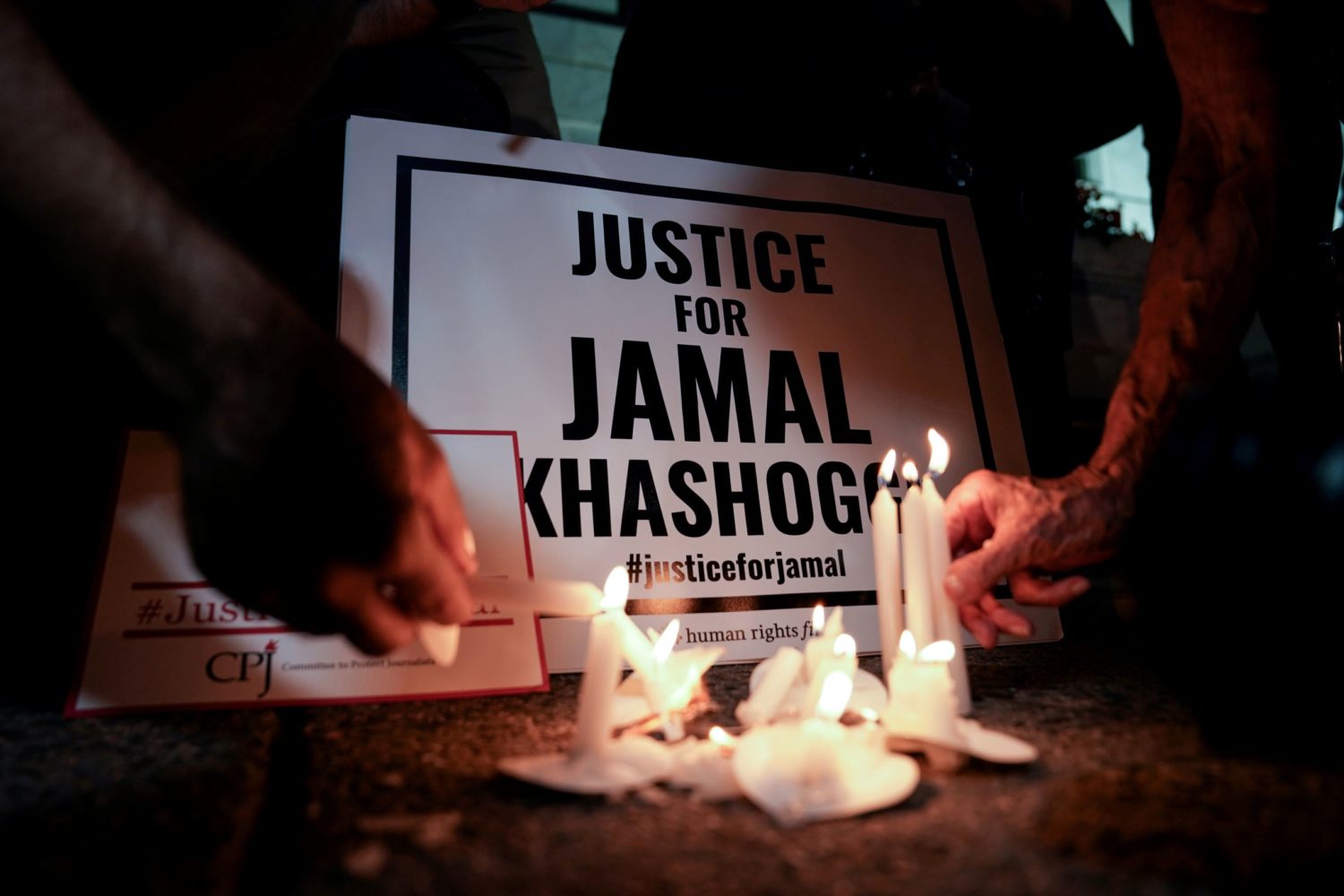
Saudi sentences five to death, three to jail over Khashoggi murder
By Marwa Rashad
RIYADH (Reuters) – Saudi Arabia on Monday sentenced five people to death and three more to jail over the murder of Saudi journalist Jamal Khashoggi last year and said the killing was not premeditated, a verdict criticized by a U.N. investigator as a “mockery” of justice.
The court dismissed charges against the remaining three of the 11 people that had been on trial, finding them not guilty, Saudi Deputy Public Prosecutor and spokesman Shalaan al-Shalaan said. None of the defendants’ names was immediately released.
“The investigation showed that the killing was not premeditated … The decision was taken at the spur of the moment,” Shalaan said, a position contradicting the findings of a United Nations-led investigation.
Khashoggi was a U.S. resident and critic of Saudi Crown Prince Mohammed bin Salman, the kingdom’s de facto ruler. He was last seen at the Saudi consulate in Istanbul on Oct. 2, 2018, where he had gone to obtain documents for his impending wedding. His body was reportedly dismembered and removed from the building, and his remains have not been found.
Eleven Saudi suspects were put on trial over his death in secretive proceedings in the capital Riyadh.
Khashoggi’s murder caused a global uproar, tarnishing the crown prince’s image. The CIA and some Western governments have said they believe Prince Mohammed, also known as MbS, ordered the killing.
Saudi officials say he had no role, though in September Prince Mohammed for the first time indicated some personal accountability for the murder, saying “it happened under my watch”.
Agnes Callamard, the U.N. special rapporteur for extrajudicial summary or arbitrary executions, on Monday lambasted the trial verdict as a “mockery” of justice.
“The hit-men are guilty, sentenced to death. The masterminds not only walk free, they have barely been touched by the investigation and the trial,” she said on Twitter.
The U.N.-led inquiry reported in February that the evidence pointed to “a brutal and premeditated killing, planned and perpetrated” by Saudi officials.
TWO SENIOR FIGURES FREED AFTER PROBE
Last November the Saudi prosecutor said that Saud al-Qahtani, a former high-profile Saudi royal adviser, had discussed Khashoggi’s activities before he entered the Saudi consulate with the team which went on to kill him.
The prosecutor had said Qahtani acted in coordination with deputy intelligence chief Ahmed al-Asiri, who he said had ordered Khashoggi’s repatriation from Turkey and that the lead negotiator on the ground then decided to kill him.
Both men were dismissed from their positions but while Asiri was tried, Qahtani was not.
On Monday Shalaan said Asiri has been tried and released due to insufficient evidence, and Qahtani had been investigated but was not charged and had been released.
Shalaan also said the Saudi consul-general to Turkey at the time, Mohammed al-Otaibi, had been freed after Turkish witnesses said Otaibi had been with them on the day of the crime. Two weeks ago, the United States barred Otaibi from entering the country.
Sources familiar with the matter told Reuters last year that Maher Mutreb, the lead negotiator, and Salah al-Tubaigy, a forensic expert specializing in autopsies, were also on trial for the murder and could face the death penalty.
On Monday Shalaan said that when the Saudi team that entered the consulate saw that it would not be possible to transfer Khashoggi to a safe place to continue negotiating, they decided to kill him.
“It was agreed, in consultation between the head of the negotiating team and the culprits, to kill Jamal Khashoggi inside the consulate,” Shalaan said in response to questions from journalists.
31 PEOPLE INVESTIGATED
Turkey said on Monday the trial outcome was far from serving justice and repeated its call for better Saudi judicial cooperation.
“The fact that important issues like the location of the late Khashoggi’s body, the identification of the instigators and, if there are any, the local co-operators, are still in the dark is a fundamental shortcoming to justice being served and accountability,” Foreign Ministry spokesman Hami Aksoy said.
Callamard, the U.N. rapporteur, criticized the trial for having been held behind closed doors, saying that the conditions in international law for doing so had not been met.
Human rights group Amnesty International also criticized the closed trial, branding the verdict a “whitewash”.
“The verdict fails to address the Saudi authorities’ involvement in this devastating crime or clarify the location of Jamal Khashoggi’s remains,” Amnesty said in a statement.
In the murder investigation, 21 people were arrested and 10 called in for questioning without arrest, according to Shalaan.
Riyadh’s criminal court pronounced the death penalty on five defendants “for committing and directly participating in the murder of the victim”. The three sentenced to prison were given various sentences totaling 24 years “for their role in covering up this crime and violating the law”.
Shalaan added the investigations proved there was no “prior enmity” between those convicted and Khashoggi.
The verdicts can still be appealed.
(Reporting by Marwa Rashed in Riyadh; Additional reporting by Nafisa Eltahir and Maha El Dahan in Dubai; Writing by Lisa Barrington; Editing by Mark Heinrich)





